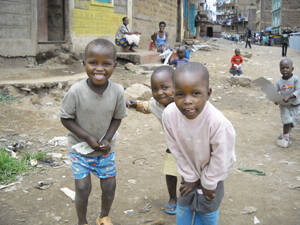A World Bank report offers rare good news on global poverty. According to World Bank estimates released on Feb. 29, in every region of the developing world the percentage of extreme poverty, people living on less than $1.25 a day, and the total number of global poor declined between 2005 and 2008. World Bank researchers add that despite the recent global economic crisis and associated spikes in commodity and food costs since 2008, recent analysis reveals that global poverty overall kept falling through 2010.
In fact, preliminary estimates for 2010 indicate that the $1.25-a-day poverty rate had fallen to under half of its 1990 value by 2010. This would mean that the first U.N. Millennium Development Goal of halving extreme poverty from its 1990 level has been achieved before the 2015 deadline. An estimated 1.29 billion people in 2008 lived below $1.25 a day, equivalent to 22 percent of the population of the developing world. By contrast, 1.94 billion people were living in extreme poverty in 1981.
So are the improving poverty figures cause for universal celebration? Not so fast, say some global development analysts. Paul Miller, a foreign aid advisor for Catholic Relief Services, said the numbers overall offered good news, but the problem of poverty “hasn’t improved enough that the commitments made for the developing world should let up.
“Some of these ‘victories,’” he said, “are quite tentative.” And Miller is skeptical that the World Bank’s post-2008 numbers can be trusted. He said the recent cost spikes in basic commodities like rice, wheat, corn and sugar have been devastating to the world’s poorest people. He suspects a more accurate depiction of global poverty since the Great Recession awaits a more comprehensive analysis.
Still, Miller believes it is important to note progress on poverty when that is possible. Citing the positive outcomes of antimalaria campaigns and their impact on poverty reduction, he said, “There is increasing evidence that some of these targeted interventions do make a difference.” Miller argues that global donors need to be confident that their antipoverty disbursements are not “going down a rat hole.”
“If you made none of the Millennium Development Goals by 2015, and certainly a lot of them won’t be met, that would lead a lot of people to question our approaches” to fighting poverty—particularly, he worries, the efficacy of foreign aid.
Aldo Caliari, director of the Rethinking Bretton Woods project for the Center of Concern in Washington, is worried that cheerleading reports on poverty reduction merely provide cover for first world donors to “declare victory and go home.” That outcome is especially tempting as industrialized powers this year confront the kind of debt crisis better known to the developing world.
Gross poverty measures mask isolated crises, Caliari said, and vast income and wealth disparities. He adds that donor nations may focus on the report’s overall positives without questioning if the world could have done more to reduce poverty. Caliari points out that during the time frame of the study, global wealth increased dramatically, but a proportional impact on poverty was not realized. That suggests, he said, that “the policies we are implementing are not necessarily the best ones because we could have done a lot better.”








